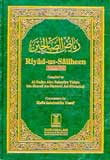Riyad Us-Saliheen (Gardens of the Righteous)

Chapter 205
Witr Prayer, its Time and Ruling
1132. `Ali (bin Abu Talib) (May Allah be pleased with him) reported: The Witr prayer is not obligatory as the prescribed Salat (prayers), but the Messenger of Allah (PBUH) observed it as his regular practice (Sunnah). He (PBUH) said, "Allah is Witr (single, odd) and loves what is Witr. So perform Witr prayer. O followers of Qur'an, observe Witr (prayer).''
[At-Tirmidhi and Abu Dawud].
Commentary: "Witr'' literally means odd number. "Allah is Witr'' means He is One in Attributes and Actions and has no equal. Witr prayer is also called Witr for the reason that it is performed in one, three, five and seven Rak`ah. It is not permissible to perform it in an even number, like two, four, six, eight etc. Thus, we learn from this Hadith that Witr is not Fard and Wajib but Sunnah Mu'akkadah (compulsory). But it would not be correct to show any slackness in performing them to this reason because every Muslim should do his level best to follow the Sunnah of the Prophet (PBUH).
1133. `Aishah (May Allah be pleased with her) reported: The Messenger of Allah (PBUH) observed Witr prayer in every part of night at the beginning, middle and at the last part. He (PBUH), however, would finish his Witr prayer before dawn.
[Al-Bukhari and Muslim].
Commentary: This Hadith tells us the timing of Witr prayer. Its earliest time is soon after `Isha' prayer and its time is just before dawn.
1134. Ibn `Umar (May Allah be pleased with them) reported: The Prophet (PBUH) said, "Make Witr prayer the last of your Salat at night.''
[Al-Bukhari and Muslim].
Commentary: Some `Ulama' are of the opinion that after performing the Witr prayer, it is not permissible to perform any other Nawafil prayers because the Prophet (PBUH) ordered to make it the last Salat. But Imam An-Nawawi and some other scholars have interpreted it as "desirable'' rather than an order, because we do find instances in which the Prophet (PBUH) performed two Rak`ah Nafl prayer in the sitting position after Witr prayer. It is, therefore, better to go by this Hadith. But if someone wants to perform two Rak`ah Nafl prayer after Witr, prayer it is permissible.
1135. Abu Sa`id Al-Khudri (May Allah be pleased with him) reported: The Prophet (PBUH) said, "Perform Witr prayer before dawn.''
[Muslim].
1136.`Aishah (May Allah be pleased with her) reported: The Prophet (PBUH) used to perform his voluntary prayer at night (i.e., Tahajjud prayer) while she was sleeping in front of him; and when the Witr prayer was yet to be observed, he would awaken her to perform her Witr prayer.
[Muslim].
Commentary: This Hadith makes the following three points:
1.It is permissible to pray with someone sleeping in front of us.
2.It is desirable to awaken one's own family members for Nafl prayer.
3.One can perform, Witr prayer before Fajr prayer.
1137. Ibn `Umar (May Allah be pleased with them) reported: The Prophet (PBUH) said, "Hasten to perform the Witr prayer before dawn.''
[Abu Dawud and At-Tirmidhi].
1138. Jabir (May Allah be pleased with him)reported: The Messenger of Allah (PBUH) said, "He who apprehends that he may not get up in the later part of the night, should observe the Witr prayer in the first part of it; and he who is certain to get up in the last part of it, he should observe Witr at the end of the night, because Salat at the end of the night is attended (by the angels), and that is better.''
[Muslim].
Commentary: If a person is confident that he will get up to perform Witr prayer before dawn, it is better for him to perform it in the late hours of the night; otherwise, it will be well to do so after `Isha' prayer.
